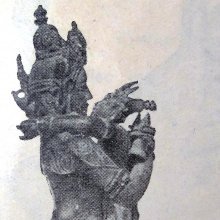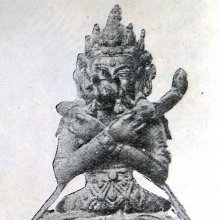Duality: 2 definitions
Introduction:
Duality means something in Hinduism, Sanskrit. If you want to know the exact meaning, history, etymology or English translation of this term then check out the descriptions on this page. Add your comment or reference to a book if you want to contribute to this summary article.
Images (photo gallery)
In Hinduism
Yoga (school of philosophy)
Source: ORA: Amanaska (king of all yogas): A Critical Edition and Annotated Translation by Jason BirchDuality is denoted by the Sanskrit term Dvaita, according to the Viṣṇudharma verse 96.25-26.—Accordingly, while discussing the cessation of mind: “Since [duality is based on mental activity and non-duality on the ultimate truth], the activities of mind, which are caused by meritorious and unmeritorious actions, should be stopped. Because of their cessation, duality (dvaita) does not arise. This duality, which consists of whatever is moving and unmoving, is an object of mind. When the mind has become without thoughts, then one obtains the absence of duality”.

Yoga is originally considered a branch of Hindu philosophy (astika), but both ancient and modern Yoga combine the physical, mental and spiritual. Yoga teaches various physical techniques also known as āsanas (postures), used for various purposes (eg., meditation, contemplation, relaxation).
Vedanta (school of philosophy)
Source: ORA: Amanaska (king of all yogas): (Advaita Vedanta)Duality is denoted by the Sanskrit term Dvaita, according to the Māṇḍūkyopaniṣatkārikā 3.31-32.—Accordingly, while discussing duality and mental activity: “All this duality (dvaita) which is [comprising of] whatever is moving and motionless is [just] a visible object of the mind. For when [the state of] no-mind of mind [arises], duality is not perceived. [Why is this?] When the mind does not conceptualize because [one has] realized the truth of the self, then, it goes to the state of no mind. Therefore, in the absence of perceivable objects, there is no perception [of duality]”.

Vedanta (वेदान्त, vedānta) refers to a school of orthodox Hindu philosophy (astika), drawing its subject-matter from the Upanishads. There are a number of sub-schools of Vedanta, however all of them expound on the basic teaching of the ultimate reality (brahman) and liberation (moksha) of the individual soul (atman).
See also (Relevant definitions)
Ends with: Individuality.
Full-text (+469): Dvaita, Advaita, Advaya, Dvaividhya, Dvitva, Dvaidhibhava, Advayatva, Manodrishya, Paramadvaita, Dvaidha, Vishishta Advaita, Absence, Attuvaitam, Dvaitabhava, Ihashila, Adharma, Dharmadharma, Dharmanimitta, Nirodhavya, Dharma.
Relevant text
Search found 175 books and stories containing Duality; (plurals include: Dualities). You can also click to the full overview containing English textual excerpts. Below are direct links for the most relevant articles:
Vimalakīrti Sutra (by John R. McRae)
Chapter IX - The Dharma Gate of Nonduality < [Fascicle Two]
Chapter III - Disciples < [Fascicle One]
Vimalakirti Nirdesa Sutra (by Charles Luk)
Shrimad Bhagavad-gita (by Narayana Gosvami)
Verse 7.27 < [Chapter 7 - Vijñāna-Yoga (Yoga through Realization of Transcendental Knowledge)]
Verse 4.22 < [Chapter 4 - Jñāna-Yoga (Yoga through Transcendental Knowledge)]
Verse 5.3 < [Chapter 5 - Karma-sannyāsa-yoga (Yoga through Renunciation of Action)]
Cidgaganacandrika (study) (by S. Mahalakshmi)
Verse 53 [Ṣaḍadhvātīta and Bheda Bhāva] < [Chapter 2 - Second Vimarśa]
Part 1a - Krama system (Introduction) < [Krama system and Trika school]
Part 5 - Three Upayas (means to enter universal God consciousness) < [Philosophy of Kashmir Tantric System]
Total Acceptance < [October – December, 2005]
Journey to the Pathless Land < [July – September, 1998]
Thought Minims < [January – March, 1986]
Thirty minor Upanishads (by K. Narayanasvami Aiyar)
Related products



